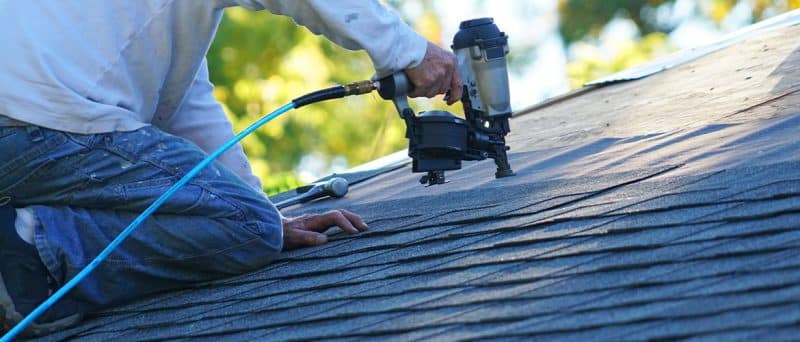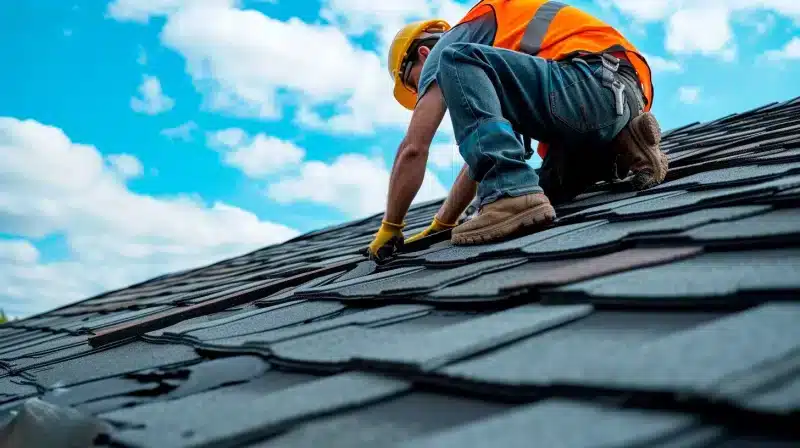
Renovating your home in New Jersey can be both an exciting and challenging task, particularly when it comes to finding the right roofing contractor. The roof not only protects your home from the elements but also plays a crucial role in the overall aesthetics of your property. Unfortunately, severe weather can cause significant damage to your roof, making it essential to choose a reliable roofing contractor.
Recently, ABC7 New York reported that storms in the NJ area caused extensive home damage, particularly to roofs. NJ.com has warned that these storms are expected to worsen in the coming months, with forecasts even predicting a high likelihood of tornadoes. Under these circumstances, finding the right roofing contractor becomes vital for NJ residents, as they may need roof repairs or replacements at any moment.
Here are some comprehensive tips to help you find the perfect roofing contractor for your New Jersey home renovation.
Research Local Contractors
Begin your search by focusing on local contractors in New Jersey. Local contractors are more familiar with local building codes, weather conditions, and common roofing issues specific to the region. They are also more accessible for follow-up work or warranty claims. Local contractors often have established relationships with local suppliers, which can sometimes lead to better pricing on materials.
Utilize local directories, online reviews, and recommendations from neighbors or friends who have recently completed roofing projects. Platforms like Yelp, Angie’s List, and the Better Business Bureau (BBB) can provide valuable insights into the reputation and reliability of potential contractors. Checking social media platforms and community forums can also give you firsthand accounts of other homeowners’ experiences with local contractors.
Benefits of Local Contractors:
- Familiarity with New Jersey’s building codes and regulations
- Understanding of local weather patterns and challenges
- Easier to contact for follow-up work or warranty claims
- Established relationships with local suppliers
Verify Credentials and Licenses
In New Jersey, roofing contractors must obtain licensing from the New Jersey Division of Consumer Affairs. This licensing ensures that the contractors meet specific criteria for skill and professionalism. Licensed contractors are also more likely to adhere to industry standards and regulations, which helps protect you from subpar workmanship.
Additionally, verify that the contractor has both liability insurance and workers’ compensation insurance. This precaution protects you from potential liabilities in case of accidents or damages during the roofing project. Checking credentials also helps to avoid scams and ensures that you are working with a legitimate business. Ask the contractor to provide copies of their license and insurance certificates, and confirm their validity with the issuing authorities.
Key Points to Check:
- New Jersey Division of Consumer Affairs licensing
- Liability insurance coverage
- Workers’ compensation insurance
- Verification of credentials with issuing authorities
Check Experience and Expertise
As per Montclair Roofing, experience plays a pivotal role in the roofing industry. Look for contractors who boast extensive tenure in the industry and possess a demonstrated history of successful projects.
Only seek construction insights from a New Jersey roofing company or service provider with years of experience in their pockets. Experienced contractors can better handle unexpected challenges and are knowledgeable about the best roofing materials and techniques for your specific needs.
Inquire about the contractor’s expertise with the roofing material you plan to use, whether it’s asphalt shingles, metal roofing, slate, or another type. Experienced contractors can offer valuable advice on the best materials and methods for New Jersey’s climate. An experienced contractor is also likely to have a more streamlined process, reducing the overall time needed to complete your project. Ask for references from past clients and, if possible, visit completed projects to assess the quality of their work.
Why Experience Matters:
- Better problem-solving skills for unexpected issues
- Knowledge of the best materials for local climate conditions
- Efficient project management
- Proven track record of successful projects
Request Detailed Estimates
Before making a final decision, obtain comprehensive written estimates from at least three different roofing contractors. A detailed estimate should include costs for materials, labor, permits, cleanup, and any additional fees. It should also outline the scope of work, including the specific tasks to be performed and the timeline for completion.
Carefully compare these estimates, not just for the total cost but also for the quality of materials and scope of work outlined. Transparent and detailed estimates demonstrate a contractor’s professionalism and commitment to quality service. It also helps you budget accurately and prevents unexpected costs from arising during the project. Pay attention to any significant discrepancies between estimates, and ask contractors to explain their pricing in detail.
What to Look for in Estimates:
- Breakdown of material and labor costs
- Timeline for project completion
- Permits and cleanup costs
- Any additional fees
Ask About Warranties
Manufacturer warranties typically cover defects in roofing materials, while workmanship warranties address installation-related issues. Understanding the duration and coverage of these warranties is crucial, especially given New Jersey’s harsh weather conditions.
Ensure you receive all warranty details in writing and fully understand the terms and conditions. Knowing the specifics of warranties can save you from future expenses if something goes wrong with your roof after the installation is complete. Ask the contractor to explain the warranty coverage, including what is covered, the duration, and any conditions that might void the warranty.
Types of Warranties:
- Manufacturer warranties for material defects
- Workmanship warranties for installation issues
- Duration and coverage details
- Conditions that could void the warranty
Inspecting and Maintaining Your Roof
Once your new roof is installed, regular inspections and maintenance are essential to prolong its lifespan and ensure it continues to protect your home effectively. Schedule routine inspections at least twice a year, preferably in the spring and fall, to identify and address any potential issues before they escalate into major problems.
Clear debris from the roof, gutters, and downspouts to prevent water damage and ensure proper drainage. Trim overhanging branches to minimize the risk of damage from falling limbs. If you notice any signs of damage, such as missing shingles, leaks, or sagging areas, contact a professional roofing contractor immediately for repairs.
Maintenance Tips:
- Schedule biannual inspections
- Clear debris from roof and gutters
- Trim overhanging branches
- Address signs of damage promptly
Understanding Roofing Materials
Choosing the right roofing material is crucial for both the durability and aesthetics of your roof. Different materials offer various benefits and drawbacks, and the best choice will depend on your specific needs and preferences.
Asphalt Shingles: These are the most common roofing material due to their affordability and ease of installation. They come in a variety of colors and styles but may have a shorter lifespan compared to other materials.
Metal Roofing: Known for its durability and longevity, metal roofing is resistant to extreme weather conditions. It is also energy-efficient, reflecting sunlight to reduce cooling costs. However, it can be more expensive and noisy during rainstorms.
Slate and Tile: These materials are highly durable and offer a distinctive, attractive appearance. They are fire-resistant and can last for over a century with proper maintenance. However, they are heavy and require a strong supporting structure, making them more expensive to install.
Wood Shingles and Shakes: These provide a natural, rustic look and are environmentally friendly. They offer good insulation and can last up to 50 years with proper maintenance. However, they require more maintenance and can be susceptible to fire and rot.
Pros and Cons of Common Roofing Materials:
- Asphalt Shingles: Affordable, versatile, shorter lifespan
- Metal Roofing: Durable, energy-efficient, expensive, noisy
- Slate and Tile: Long-lasting, attractive, heavy, costly
- Wood Shingles and Shakes: Natural look, good insulation, high maintenance
Frequently Asked Questions (FAQs)
How do roofers decide whether to repair or replace a roof?
Roofers assess the extent of damage, age, and condition of the roofing materials to decide. Minor issues may favor repair, while extensive damage or old age often necessitates replacement.
Can roofs be replaced in a day?
Yes, roofs can often be replaced in a day, depending on the size, complexity, and efficiency of the crew.
Can storms blow away roofs?
Yes, severe storms with high winds can cause significant damage, including roof displacement.
What should I do in case of emergency roof damage?
In the event of emergency roof damage, immediately contact a reliable local roofing contractor to assess and mitigate the damage. Temporarily cover the damaged area with a tarp to prevent further water intrusion until professional help arrives.
How often should I inspect my roof?
It is advisable to inspect your roof at least twice a year, preferably in the spring and fall, to identify and address any potential issues before they escalate into major problems.
How can I extend the lifespan of my roof?
Regular maintenance is key to extending the lifespan of your roof. This includes cleaning gutters, removing debris, inspecting for damage, and performing timely repairs. Choosing high-quality materials and professional installation also contributes to a longer-lasting roof.
What are the signs that my roof needs replacing?
Common signs that indicate your roof may need replacing include missing or damaged shingles, persistent leaks, sagging, and visible wear and tear. If your roof is over 20 years old, it may also be time to consider a replacement.
How do I handle disputes with my roofing contractor?
To handle disputes with your roofing contractor, document all communications and agreements, keep records of payments, and attempt to resolve issues directly with the contractor. If necessary, seek mediation through local consumer protection agencies or take legal action as a last resort.
In conclusion, choosing the right roofing contractor for your home renovation in New Jersey is a critical decision that requires thorough research. By following these tips, you can find a trustworthy and skilled professional to ensure the success of your roofing project.
A well-executed roofing project not only enhances the aesthetic appeal and value of your home but also provides essential protection against New Jersey’s varied weather conditions. Take the time to select the right contractor, and you will enjoy the benefits of a durable roof for years to come.









